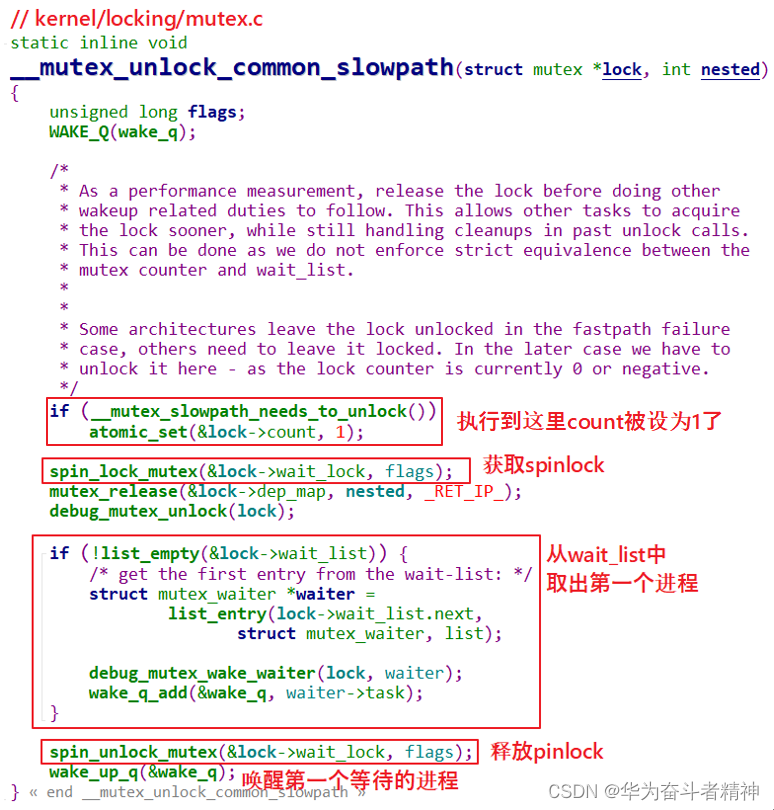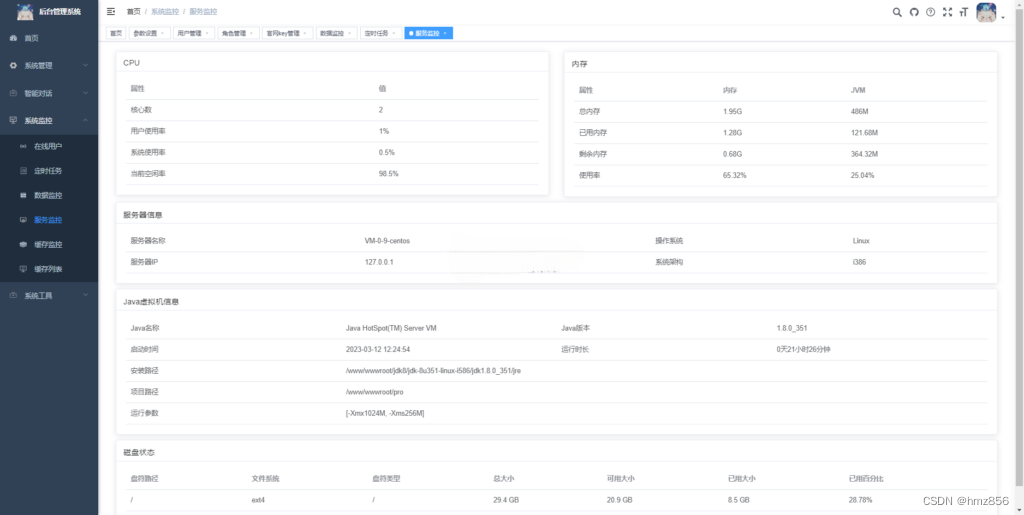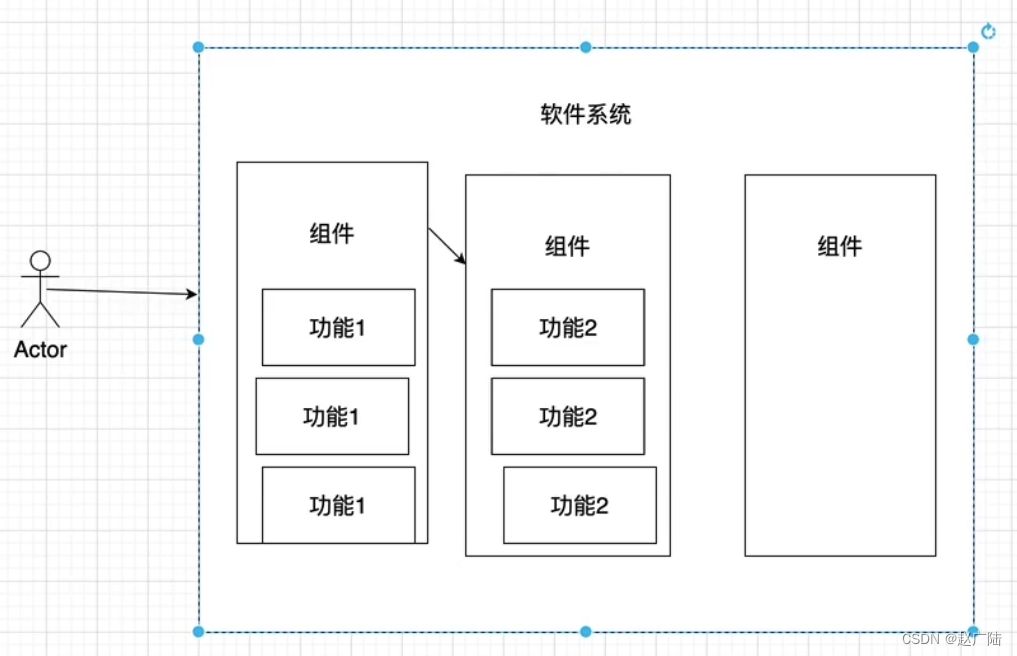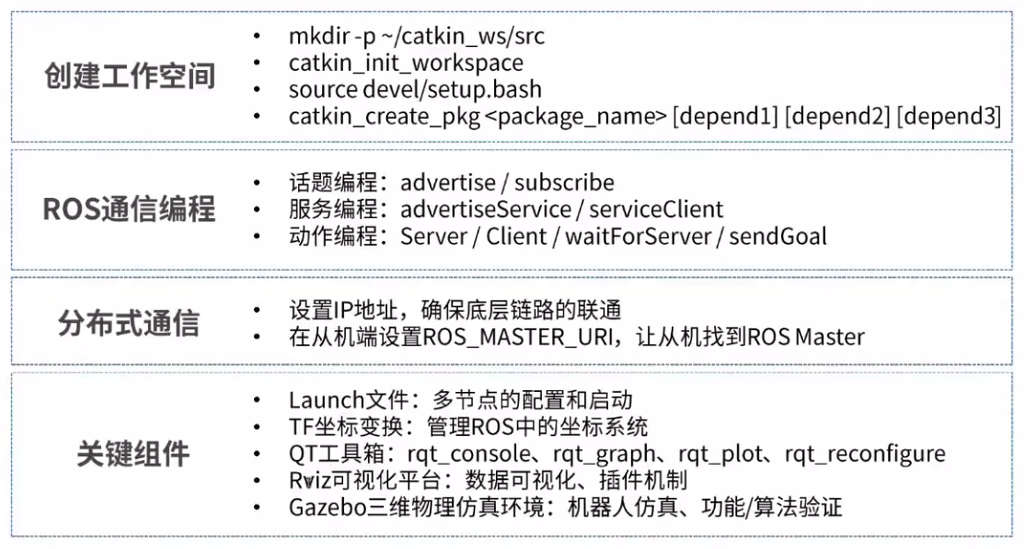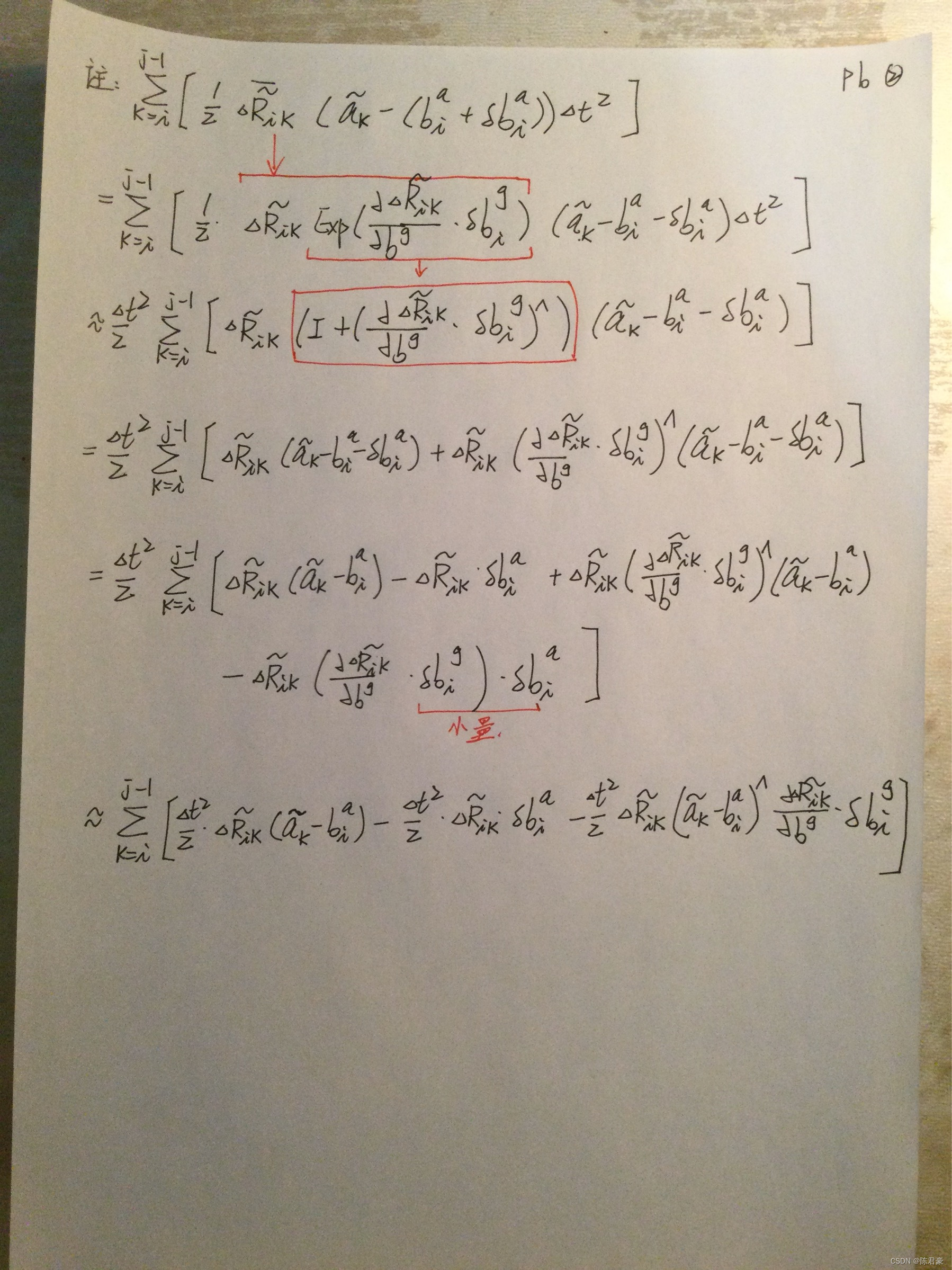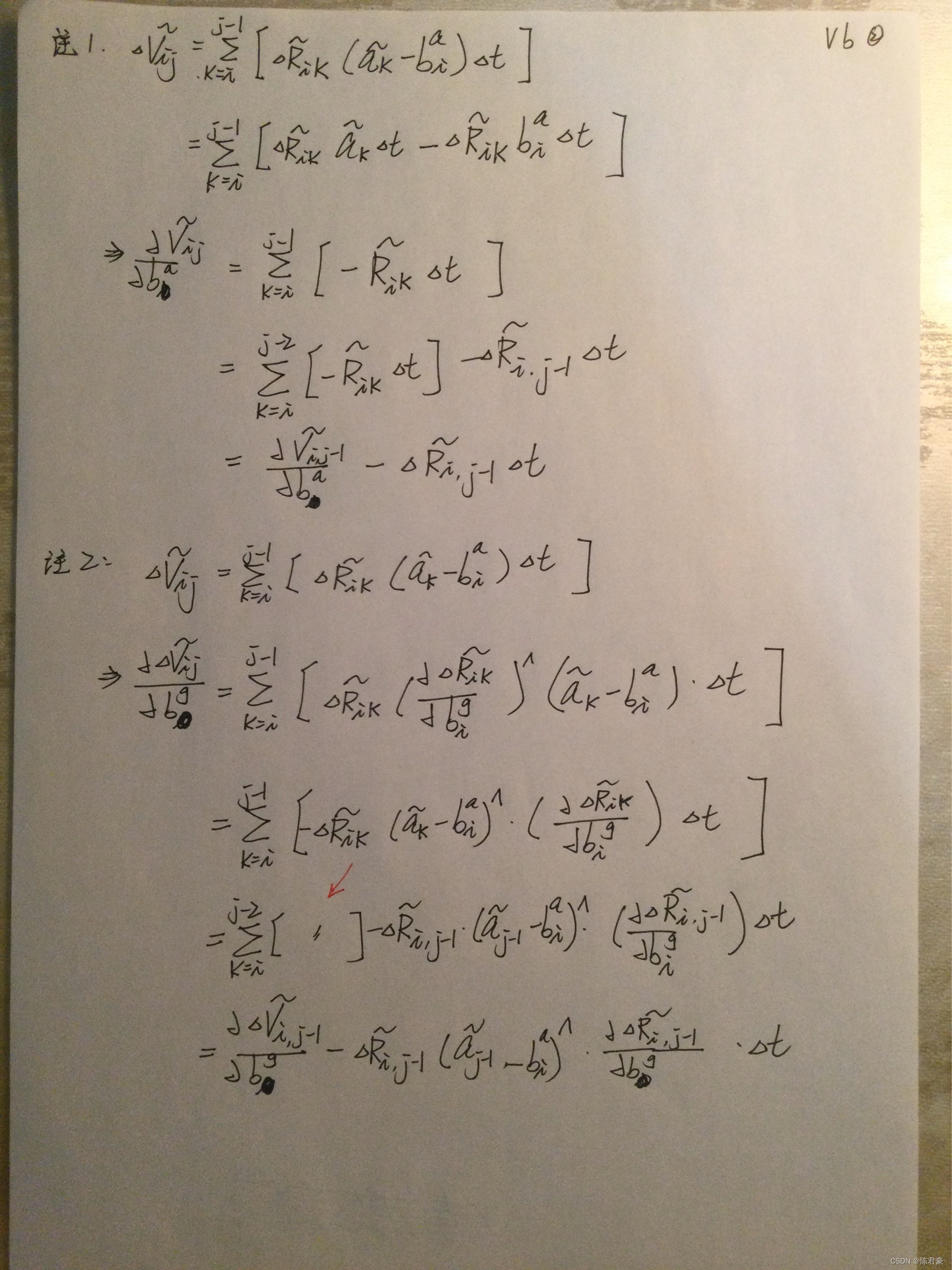在Linux Kernel 的AMDGPU驱动实现中,dma-fence扮演着重要角色,AMDGPU的Render/解码操作可能涉及到多个方面同时引用buffer的情况,以渲染/视频解码场景为例,应用将渲染/解码命令写入和GPU共享的BUFFER之后,需要将任务提交给GPU的运行队列等待执行,这个时候,应用不仅要监听buffer中任务的执行情况,还要保证在任务执行完毕之前,不能再去修改BUFFER中的数据。而AMDGPU也需要排它性地执行BUFFER命令。在GPU执行结束,应用希望及时得到执行完的信息,以便回收BUFFER重新利用,通知一般由绑定到某个BUFFER上的中断完成。这些操作,如果使用经典的共享BUFFER+锁的方式进行保护和同步,不但效率十分低下,而且各类内核机制杂糅在一起,缺乏一个统一的管理框架,使代码难以维护。 dma-fence则提供了一套简单便捷的机框架,将原子操作,休眠唤醒,同步/异步事件通知等功能嵌入到各种类型的BUFFER管理框架中,将各类机制有机的结合在一起,减少了用户态空间的忙等,使buffer使用更加智能高效。
以AMDGPU解码视频为例,利用dma-fence ring buffer隔离了应用解码请求和解码任务任务本身,提交任务和解码完成通知均通过BUFFER绑定的dma-fence进行交互:
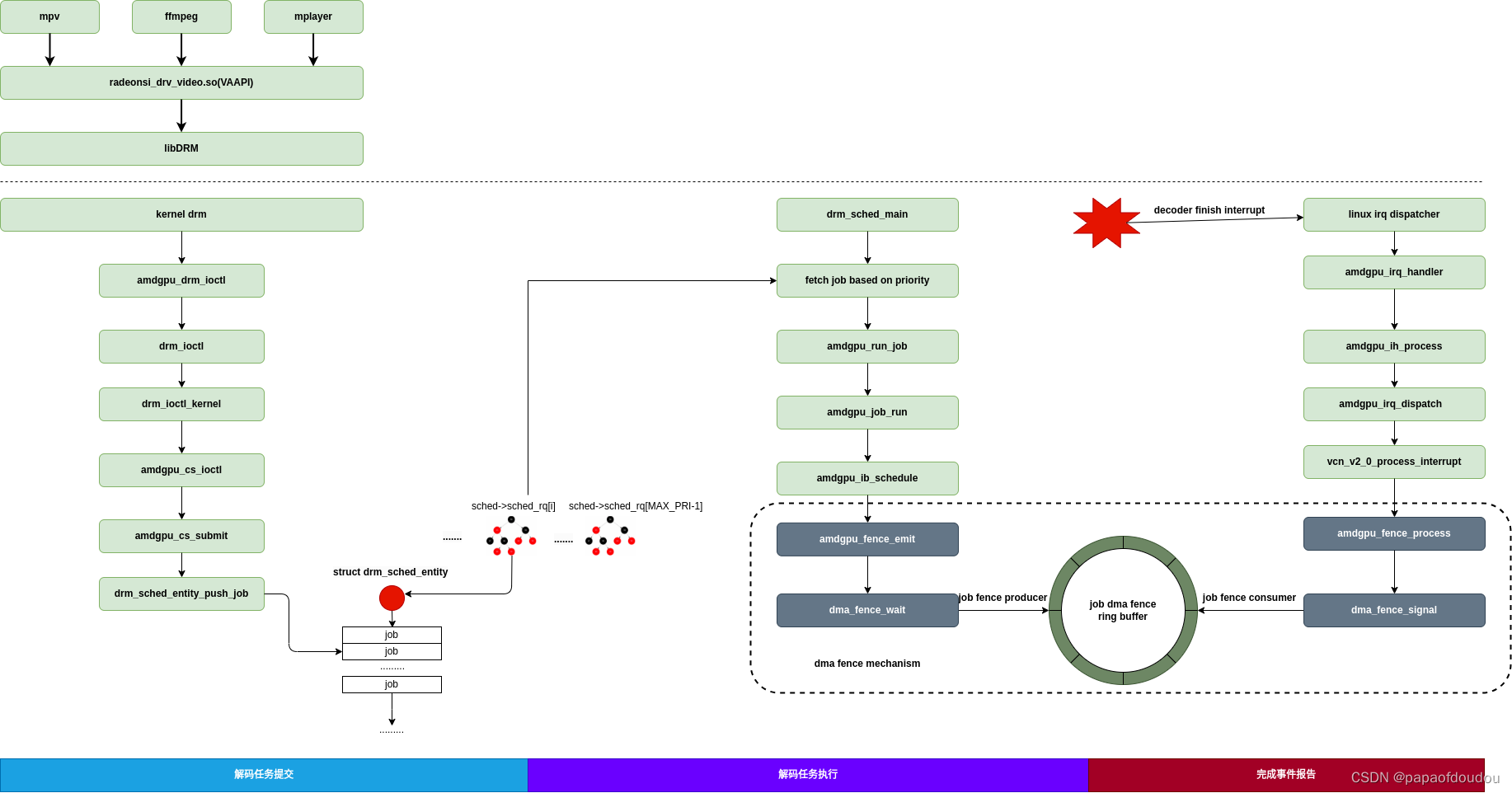
为了便于分析,我把5.4内核中AMDGPU这部分的实现提取出来,写了一个可以独立加载执行的内核模块demo,类似于CMODEL,任务提交上下文和解码完成通知上下文在AMDGPU驱动中分别用内核线程和中断实现,在demo中则全部用内核线程实现.
工作模型如下图所示:

fence array有256个slot,每个位置代表一个fence.构成一个RING BUFFER。sync_seq为写指针序号,sync_seq只增不减,sync_seq mod 256为在array中的index,相当于RING BUFFER的写指针。
last_seq代表当前已经消耗掉(已完成处理的和fence绑定的buffer)的序号,同sync_seq一样,它也是单调递增的自然序列,last_seq mod 256 为在array中的index,相当于ring buffer的读指针。
而fence_seq则表示写位置的一个抽样,这是一个在AMDGPU中的hardware ring是所有进程共享的,每个进程随时可能会提交新的渲染任务,所以sync_seq时刻在更新,不适合处理。fence_seq则是某个时间点的快照,在last_seq和fence_seq之间的buffer(fence),都会在下一批中一并得到signal.
当提交过快,但是消耗较慢时,写方追上读方,此时需要进行生产-消费之间的同步,读端将会反压到写端,写端调用dma_fence_wait进行同步:
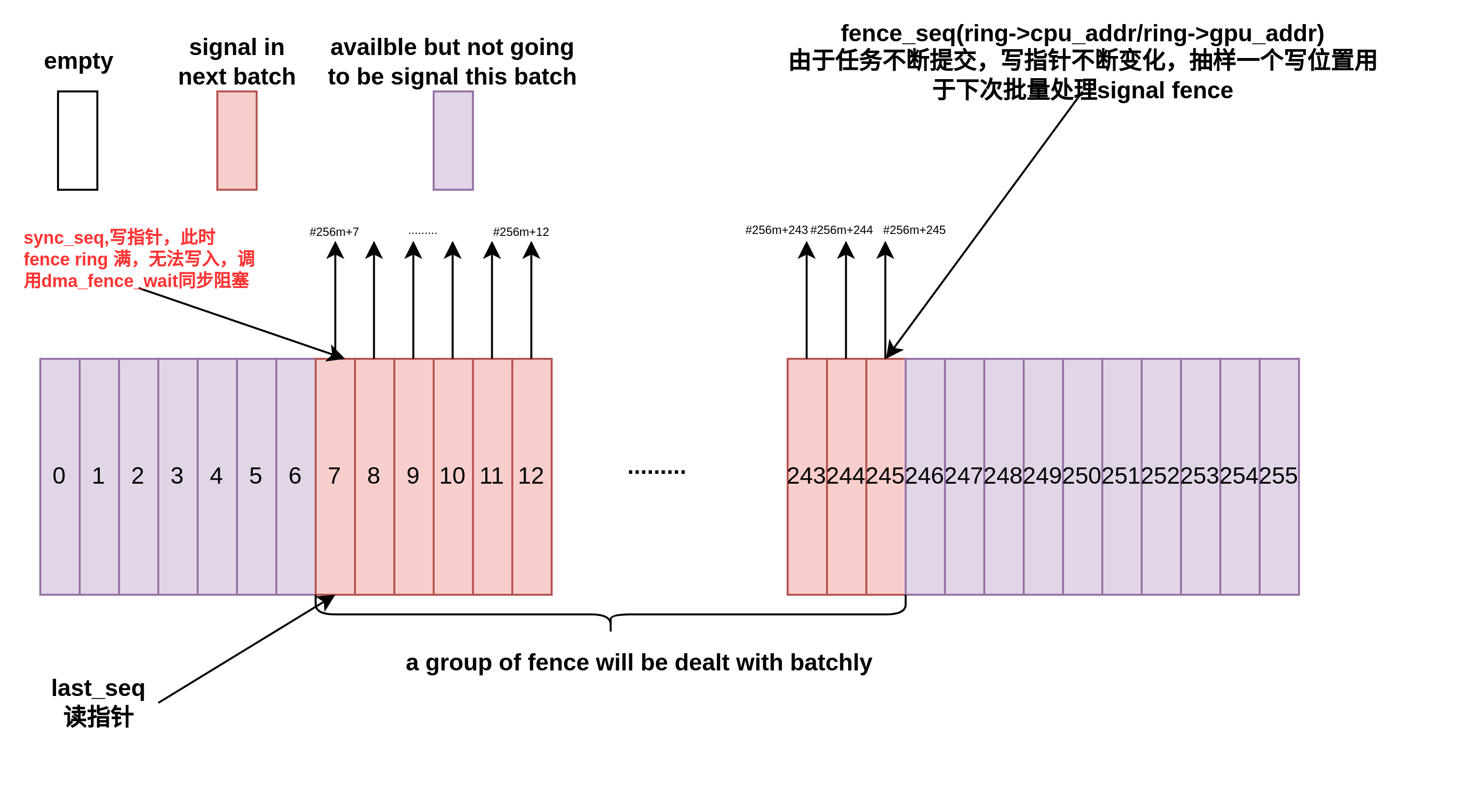
当消费方完成下一个任务后,释放当前slot,并且调用dma_fence_signal唤醒写线程,写线程受到信号后,继续执行,向fence array中填充新的任务:
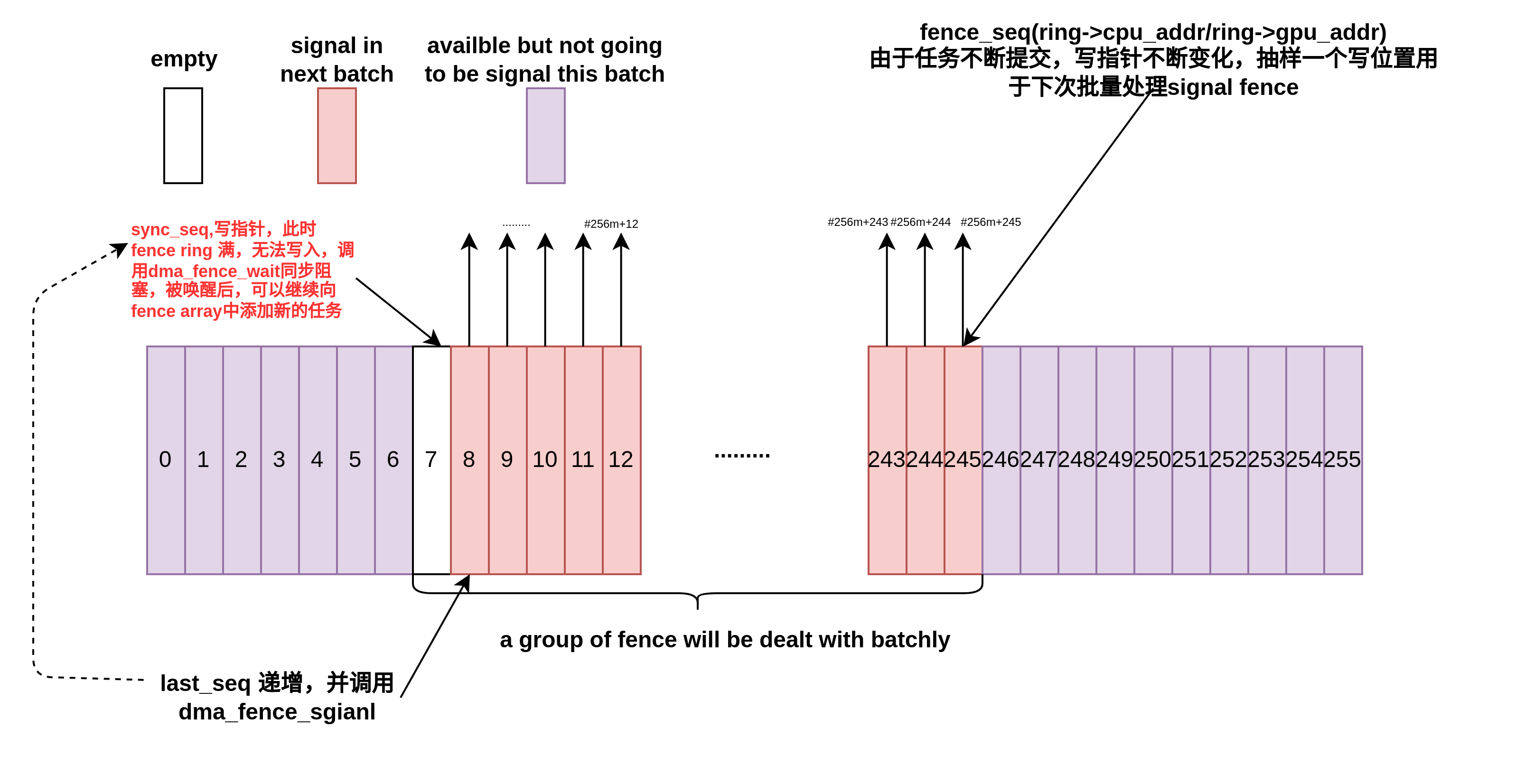
dma fence 的free
拔出萝卜带出泥,通过job fence的free触发schedule fence和finish fence的释放,释放是通过引用计数归零触发的回调,在回调用中利用RCU异步释放FENCE占用的空间。


以上就是fence array的使用过程中的几个corner case.
附code:
#include <linux/kernel.h>
#include <linux/init.h>
#include <linux/types.h>
#include <linux/spinlock.h>
#include <linux/module.h>
#include <linux/fs.h>
#include <linux/errno.h>
#include <linux/mm.h>
#include <linux/sched/signal.h>
#include <linux/dma-fence.h>
#include <linux/slab.h>
#include <linux/delay.h>
#include <linux/kthread.h>
#include <linux/sched.h>
#include <uapi/linux/sched/types.h>
#define assert(expr) \
if (!(expr)) { \
printk( "Assertion failed! %s,%s,%s,line=%d\n",\
#expr,__FILE__,__func__,__LINE__); \
BUG(); \
}
#define num_hw_submission 128
struct fence_driver {
uint64_t gpu_addr;
volatile uint32_t *cpu_addr;
uint32_t sync_seq;
atomic_t last_seq;
bool initialized;
bool initialized_emit;
bool initialized_recv;
unsigned num_fences_mask;
spinlock_t lock;
struct dma_fence **fences;
struct mutex mutex;
struct dma_fence *last_fence;
struct timer_list timer;
struct timer_list work_timer;
wait_queue_head_t job_scheduled;
};
struct fence_set {
struct dma_fence scheduled;
struct dma_fence finished;
spinlock_t lock;
};
struct job_fence {
struct dma_fence job;
void *data;
};
static uint32_t fence_seq;
static struct fence_driver *ring;
static struct task_struct *fence_emit_task;
static struct task_struct *fence_recv_task;
static struct kmem_cache *job_fence_slab;
static struct kmem_cache *sched_fence_slab;
static const char *dma_fence_get_name(struct dma_fence *fence)
{
return "dma-fence-drv";
}
static bool dma_fence_enable_signal(struct dma_fence *fence)
{
if (!timer_pending(&ring->work_timer)) {
mod_timer(&ring->work_timer, jiffies + HZ / 10);
}
printk("%s line %d, signal fenceno %lld.\n", __func__, __LINE__, fence->seqno);
return true;
}
void fencedrv_fence_free(struct rcu_head *rcu)
{
struct fence_set *fs;
struct dma_fence *f = container_of(rcu, struct dma_fence, rcu);
struct job_fence *jb = container_of(f, struct job_fence, job);
assert(jb->data != NULL);
fs = (struct fence_set *)jb->data;
// the dma_fence_get must be symmentry with dma_fence_put during all the alive.
assert((kref_read(&fs->scheduled.refcount) == 1));
assert((kref_read(&fs->finished.refcount) == 1));
//dma_fence_put(&fs->scheduled);
dma_fence_put(&fs->finished);
kmem_cache_free(job_fence_slab, jb);
// dump_stack();
}
static void fencedrv_dma_fence_release(struct dma_fence *fence)
{
// typically usage for dma fence release by rcu.
call_rcu(&fence->rcu, fencedrv_fence_free);
}
static const struct dma_fence_ops fence_ops = {
.get_driver_name = dma_fence_get_name,
.get_timeline_name = dma_fence_get_name,
.enable_signaling = dma_fence_enable_signal,
.release = fencedrv_dma_fence_release,
};
static int32_t fencedrv_get_ring_avail(void)
{
uint32_t read_seq, write_seq;
do {
read_seq = atomic_read(&ring->last_seq);
write_seq = ring->sync_seq;
} while (atomic_read(&ring->last_seq) != read_seq);
read_seq &= ring->num_fences_mask;
write_seq &= ring->num_fences_mask;
pr_err("%s line %d, read_seq %d, write_seq %d.\n",
__func__, __LINE__, read_seq, write_seq);
if (read_seq <= write_seq) {
return write_seq - read_seq;
} else {
return write_seq + num_hw_submission * 2 - read_seq;
}
}
static const char *dma_fence_get_name_scheduled(struct dma_fence *fence)
{
return "dma-fence-scheduled";
}
static const char *dma_fence_get_name_finished(struct dma_fence *fence)
{
return "dma-fence-finished";
}
static void sched_fence_free(struct rcu_head *head);
static void fencedrv_dma_fence_release_scheduled(struct dma_fence *fence)
{
struct fence_set *fs = container_of(fence, struct fence_set, scheduled);
// typically usage for dma fence release by rcu.
call_rcu(&fs->finished.rcu, sched_fence_free);
}
static void fencedrv_dma_fence_release_finished(struct dma_fence *fence)
{
struct fence_set *fs = container_of(fence, struct fence_set, finished);
dma_fence_put(&fs->scheduled);
//while (1);
}
static const struct dma_fence_ops fence_scheduled_ops = {
.get_driver_name = dma_fence_get_name_scheduled,
.get_timeline_name = dma_fence_get_name_scheduled,
.release = fencedrv_dma_fence_release_scheduled,
};
static const struct dma_fence_ops fence_finished_ops = {
.get_driver_name = dma_fence_get_name_finished,
.get_timeline_name = dma_fence_get_name_finished,
.release = fencedrv_dma_fence_release_finished,
};
static struct fence_set *to_sched_fence(struct dma_fence *f)
{
if (f->ops == &fence_scheduled_ops) {
return container_of(f, struct fence_set, scheduled);
}
if (f->ops == &fence_finished_ops) {
return container_of(f, struct fence_set, finished);
}
return NULL;
}
static void sched_fence_free(struct rcu_head *head)
{
struct dma_fence *f = container_of(head, struct dma_fence, rcu);
struct fence_set *fs = to_sched_fence(f);
if (fs == NULL)
return;
assert(f == &fs->finished);
kmem_cache_free(sched_fence_slab, fs);
dump_stack();
}
static struct fence_set *init_fence_set(void)
{
struct fence_set *fs = kmem_cache_alloc(sched_fence_slab, GFP_KERNEL);
if (fs == NULL) {
pr_err("%s line %d, alloc fence set from fence set slab failure.\n",
__func__, __LINE__);
return NULL;
}
spin_lock_init(&fs->lock);
dma_fence_init(&fs->scheduled, &fence_scheduled_ops, &fs->lock, 0, 0);
dma_fence_init(&fs->finished, &fence_finished_ops, &fs->lock, 0, 0);
return fs;
}
// ref amdgpu_fence_process
static int fence_recv_task_thread(void *data)
{
struct sched_param sparam = {.sched_priority = 1};
sched_setscheduler(current, SCHED_FIFO, &sparam);
//mutex_lock(&ring->mutex);
while (ring->initialized == false) {
set_current_state(TASK_UNINTERRUPTIBLE);
if (ring->initialized == true) {
break;
}
//mutex_unlock(&ring->mutex);
schedule();
//mutex_lock(&ring->mutex);
}
set_current_state(TASK_RUNNING);
//mutex_unlock(&ring->mutex);
while (!kthread_should_stop() && ring->initialized_recv == true) {
uint32_t seqno_next = 0;
uint32_t seq, last_seq;
int r;
do {
// last_seq is the read pointer of fence ring buffer.
last_seq = atomic_read(&ring->last_seq);
seq = *ring->cpu_addr;
if (kthread_should_stop())
return 0;
} while (atomic_cmpxchg(&ring->last_seq, last_seq, seq) != last_seq);
if (del_timer(&ring->work_timer) &&
seq != ring->sync_seq) {
mod_timer(&ring->work_timer, jiffies + HZ / 10);
}
//printk("%s line %d, last_seq %d, seq %d, sync_seq %d.\n", __func__, __LINE__, last_seq, seq, ring->sync_seq);
if (unlikely(seq == last_seq)) {
msleep(10);
continue;
}
assert(seq > last_seq);
last_seq &= ring->num_fences_mask;
seq &= ring->num_fences_mask;
//printk("%s line %d, last_seq %d, seq %d, sync_seq %d.\n", __func__, __LINE__, last_seq, seq, ring->sync_seq);
do {
struct dma_fence *fence, **ptr;
++last_seq;
last_seq &= ring->num_fences_mask;
ptr = &ring->fences[last_seq];
fence = rcu_dereference_protected(*ptr, 1);
RCU_INIT_POINTER(*ptr, NULL);
if (!fence) {
continue;
}
if (seqno_next == 0 || seqno_next == fence->seqno) {
seqno_next = fence->seqno + 1;
} else { /*if (seqno_next != 0 && seqno_next != fence->seqno)*/
pr_err("%s line %d, seqno is not continue, exptect %d, actual %lld.\n",
__func__, __LINE__, seqno_next, fence->seqno);
}
printk("%s line %d, last_seq/slot %d, seq %d, signal %lld.\n",
__func__, __LINE__, last_seq, seq, fence->seqno);
if (list_empty(&fence->cb_list)) {
printk("%s line %d, fence cb list is empty.\n",
__func__, __LINE__);
} else {
printk("%s line %d, fence cb list is not empty.\n",
__func__, __LINE__);
}
r = dma_fence_signal(fence);
if (kthread_should_stop()) {
dma_fence_put(fence);
return 0;
}
if (r) {
pr_err("%s line %d, fence already signaled.\n",
__func__, __LINE__);
continue;
//BUG();
}
dma_fence_put(fence);
} while (last_seq != seq);
wake_up(&ring->job_scheduled);
}
set_current_state(TASK_RUNNING);
return 0;
}
// ref amdgpu_fence_emit.
static int fence_emit_task_thread(void *data)
{
int r;
uint64_t oldwaitseqno = 0;
struct sched_param sparam = {.sched_priority = 1};
sched_setscheduler(current, SCHED_FIFO, &sparam);
//mutex_lock(&ring->mutex);
while (ring->initialized == false) {
set_current_state(TASK_UNINTERRUPTIBLE);
if (ring->initialized == true) {
break;
}
//mutex_unlock(&ring->mutex);
schedule();
//mutex_lock(&ring->mutex);
}
set_current_state(TASK_RUNNING);
//mutex_unlock(&ring->mutex);
while (!kthread_should_stop() && ring->initialized_emit == true) {
#if 0
msleep(1000);
printk("%s line %d.\n", __func__, __LINE__);
#else
struct dma_fence __rcu **ptr;
struct job_fence *fence;
uint32_t seq;
struct fence_set *fs = init_fence_set();
fence = kmem_cache_alloc(job_fence_slab, GFP_KERNEL);
if (fence == NULL) {
pr_err("%s line %d, alloc fence from fence slab failure.\n",
__func__, __LINE__);
return -1;
}
// ring->sync_seq is fence ring write pointer.
seq = ++ring->sync_seq;
dma_fence_init(&fence->job, &fence_ops, &ring->lock, 0, seq);
fence->data = fs;
ptr = &ring->fences[seq & ring->num_fences_mask];
//printk("%s line %d, seq = %d.\n", __func__, __LINE__, seq);
if (kthread_should_stop()) {
// will call fence_ops.release directly to free the fence.
dma_fence_put(&fence->job);
continue;
}
if (unlikely(rcu_dereference_protected(*ptr, 1))) {
struct dma_fence *old;
int diff;
rcu_read_lock();
old = dma_fence_get_rcu_safe(ptr);
rcu_read_unlock();
if (old) {
mutex_lock(&ring->mutex);
//dma_fence_get(old);
ring->last_fence = old;
mutex_unlock(&ring->mutex);
r = dma_fence_wait(old, false);
mutex_lock(&ring->mutex);
ring->last_fence = NULL;
dma_fence_put(old);
mutex_unlock(&ring->mutex);
if (kthread_should_stop() || r) {
// will call fence_ops.release directly to free the fence.
dma_fence_put(&fence->job);
continue;
}
// if overlap happened, there must be a congruences on seq and old->seqno,which means seq≡ old->seqno mod(num_hw_submission * 2)
// this implies seq = q*(num_hw_submission * 2) + old->seqno. q=1 typically.
diff = seq - old->seqno;
printk("%s line %d, fence wokenup, wakeseqno %lld, new adding seq %d, slot %d, diff %d, waken interval %lld, latestseq %d, avail %d.\n",
__func__, __LINE__, old->seqno, seq, seq & ring->num_fences_mask, diff, old->seqno - oldwaitseqno,
ring->sync_seq, fencedrv_get_ring_avail());
if (diff != num_hw_submission * 2) {
pr_err("%s line %d, fatal error, diff not match totoal ring.\n",
__func__, __LINE__);
}
oldwaitseqno = old->seqno;
}
}
#if 0
printk("%s line %d, fence emit, seqno %lld, seq %d, slot %d.\n",
__func__, __LINE__, fence->seqno, seq, seq & ring->num_fences_mask);
#endif
rcu_assign_pointer(*ptr, dma_fence_get(&fence->job));
// because no outer usage of fence, so put it here for free ok.
dma_fence_put(&fence->job);
#endif
}
set_current_state(TASK_RUNNING);
return 0;
}
void work_timer_fn(struct timer_list *timer)
{
uint32_t seqno_next = 0;
uint32_t seq, last_seq;
int r;
do {
last_seq = atomic_read(&ring->last_seq);
seq = *ring->cpu_addr;
} while (atomic_cmpxchg(&ring->last_seq, last_seq, seq) != last_seq);
if (unlikely(seq == last_seq)) {
goto end;
}
assert(seq > last_seq);
last_seq &= ring->num_fences_mask;
seq &= ring->num_fences_mask;
do {
struct dma_fence *fence, **ptr;
++last_seq;
last_seq &= ring->num_fences_mask;
ptr = &ring->fences[last_seq];
fence = rcu_dereference_protected(*ptr, 1);
RCU_INIT_POINTER(*ptr, NULL);
if (!fence) {
continue;
}
if (seqno_next == 0 || seqno_next == fence->seqno) {
seqno_next = fence->seqno + 1;
} else { /*if (seqno_next != 0 && seqno_next != fence->seqno)*/
pr_err("%s line %d, seqno is not continue, exptect %d, actual %lld.\n",
__func__, __LINE__, seqno_next, fence->seqno);
}
r = dma_fence_signal(fence);
if (r) {
pr_err("%s line %d, fence already signaled.\n",
__func__, __LINE__);
continue;
//BUG();
}
dma_fence_put(fence);
} while (last_seq != seq);
end:
pr_err("%s line %d, work timer triggerd.\n", __func__, __LINE__);
mod_timer(timer, jiffies + HZ / 10);
}
void gpu_process_thread(struct timer_list *timer)
{
uint32_t seq, oldseq;
seq = ring->sync_seq;
oldseq = fence_seq;
// trigger a job done on device.
if (fence_seq == 0) {
if (seq > 6)
fence_seq = seq - 4;
} else if ((seq - fence_seq) > 10) {
fence_seq += (seq - fence_seq) / 2;
assert(fence_seq > oldseq);
}
printk("%s line %d, timer trigger job, latest consume fence %d.\n",
__func__, __LINE__, fence_seq);
mod_timer(timer, jiffies + HZ / 2);
}
static int fencedrv_wait_empty(void)
{
uint64_t seq = READ_ONCE(ring->sync_seq);
struct dma_fence *fence, **ptr;
int r;
if (!seq)
return 0;
fence_seq = seq;
ptr = &ring->fences[seq & ring->num_fences_mask];
rcu_read_lock();
fence = rcu_dereference(*ptr);
if (!fence || !dma_fence_get_rcu(fence)) {
rcu_read_unlock();
return 0;
}
rcu_read_unlock();
r = dma_fence_wait(fence, false);
printk("%s line %d, wait last fence %lld, seq %lld, r %d.\n", \
__func__, __LINE__, fence->seqno, seq, r);
dma_fence_put(fence);
return r;
}
static int __init fencedrv_init(void)
{
if ((num_hw_submission & (num_hw_submission - 1)) != 0) {
pr_err("%s line %d, num_hw_submission must be power of two.\n",
__func__, __LINE__);
return -1;
}
ring = kzalloc(sizeof(*ring), GFP_KERNEL);
if (ring == NULL) {
pr_err("%s line %d, alloc fence driver failure.\n",
__func__, __LINE__);
return -ENOMEM;
}
// fence_seq is a snap shot of sync_seq for deal with fence batchlly.
ring->cpu_addr = &fence_seq;
ring->gpu_addr = (uint64_t)&fence_seq;
ring->sync_seq = 0;
atomic_set(&ring->last_seq, 0);
ring->initialized = false;
ring->initialized_emit = false;
ring->initialized_recv = false;
ring->last_fence = NULL;
ring->num_fences_mask = num_hw_submission * 2 - 1;
init_waitqueue_head(&ring->job_scheduled);
spin_lock_init(&ring->lock);
ring->fences = kcalloc(num_hw_submission * 2, sizeof(void *), GFP_KERNEL);
if (!ring->fences) {
pr_err("%s line %d, alloc fence buffer failure.\n",
__func__, __LINE__);
return -ENOMEM;
}
printk("%s line %d, fence mask 0x%x, num_hw_submission 0x%x.\n",
__func__, __LINE__, ring->num_fences_mask, num_hw_submission);
job_fence_slab = kmem_cache_create("job_fence_slab", sizeof(struct job_fence), 0,
SLAB_HWCACHE_ALIGN, NULL);
if (!job_fence_slab) {
pr_err("%s line %d, alloc job_fence_slab falure.\n",
__func__, __LINE__);
return -ENOMEM;
}
sched_fence_slab = kmem_cache_create("sched_fence_slab", sizeof(struct fence_set), 0,
SLAB_HWCACHE_ALIGN, NULL);
if (!sched_fence_slab) {
pr_err("%s line %d, alloc sched_fence_slab falure.\n",
__func__, __LINE__);
return -ENOMEM;
}
mutex_init(&ring->mutex);
fence_emit_task = kthread_run(fence_emit_task_thread, NULL, "fence_emit");
if (IS_ERR(fence_emit_task)) {
pr_err("%s line %d, create fence emit tsk failure.\n",
__func__, __LINE__);
return -1;
}
fence_recv_task = kthread_run(fence_recv_task_thread, NULL, "fence_recv");
if (IS_ERR(fence_recv_task)) {
pr_err("%s line %d, create fence recv tsk failure.\n",
__func__, __LINE__);
return -1;
}
timer_setup(&ring->timer, gpu_process_thread, TIMER_IRQSAFE);
add_timer(&ring->timer);
mod_timer(&ring->timer, jiffies + HZ / 2);
timer_setup(&ring->work_timer, work_timer_fn, TIMER_IRQSAFE);
add_timer(&ring->work_timer);
mod_timer(&ring->work_timer, jiffies + HZ / 10);
printk("%s line %d, module init.\n", __func__, __LINE__);
ring->initialized = true;
ring->initialized_emit = true;
ring->initialized_recv = true;
wake_up_process(fence_emit_task);
wake_up_process(fence_recv_task);
return 0;
}
static void __exit fencedrv_exit(void)
{
printk("%s line %d, module unload task begin.\n", __func__, __LINE__);
del_timer_sync(&ring->work_timer);
mutex_lock(&ring->mutex);
if ((ring->last_fence != NULL) &&
(!test_bit(DMA_FENCE_FLAG_SIGNALED_BIT, &ring->last_fence->flags))) {
ring->initialized_emit = false;
dma_fence_signal(ring->last_fence);
dma_fence_put(ring->last_fence);
}
mutex_unlock(&ring->mutex);
kthread_stop(fence_emit_task);
printk("%s line %d, module unload task mid.\n", __func__, __LINE__);
del_timer_sync(&ring->timer);
fencedrv_wait_empty();
printk("%s line %d, sync wait avail %d.\n", __func__, __LINE__, fencedrv_get_ring_avail());
wait_event_killable(ring->job_scheduled, fencedrv_get_ring_avail() <= 1);
ring->initialized_recv = false;
kthread_stop(fence_recv_task);
printk("%s line %d, module unload task end.\n", __func__, __LINE__);
ring->initialized = false;
rcu_barrier();
kmem_cache_destroy(job_fence_slab);
kmem_cache_destroy(sched_fence_slab);
kfree(ring->fences);
kfree(ring);
fence_emit_task = NULL;
fence_recv_task = NULL;
printk("%s line %d, module unload.\n", __func__, __LINE__);
}
module_init(fencedrv_init);
module_exit(fencedrv_exit);
MODULE_LICENSE("GPL");
MODULE_AUTHOR("czl");参考博客
Fence_dma fence_笔落梦昙的博客-CSDN博客

